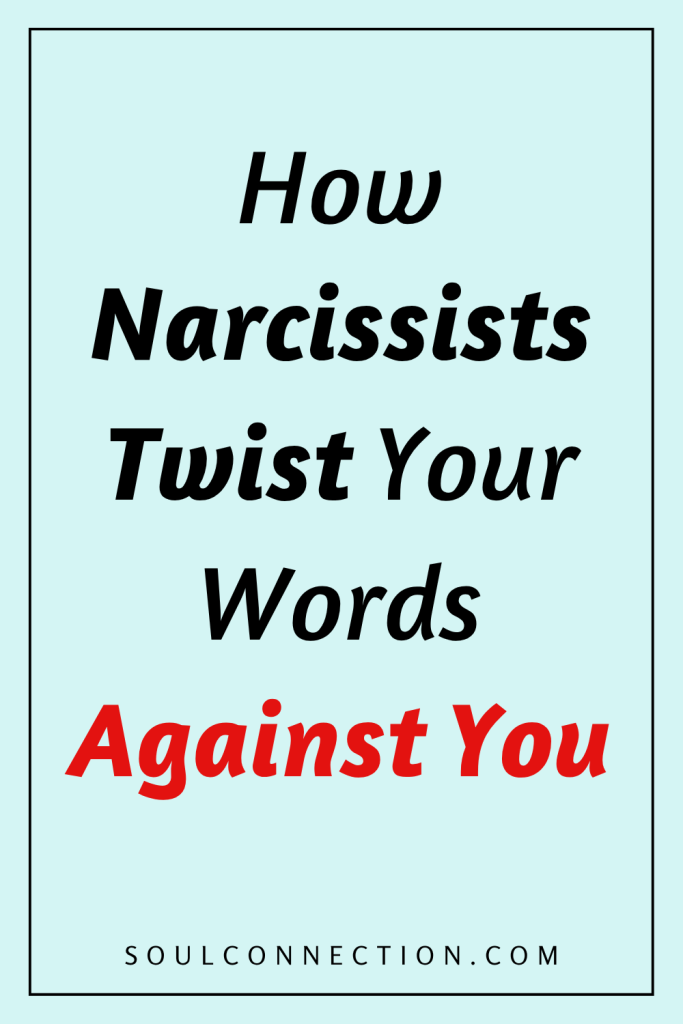Some conversations feel like wandering into a hall of mirrors—distorted reflections everywhere, no exit in sight.
That’s what it’s like arguing with a narcissist, especially when words morph into weapons and the ground rules of reality itself seem to shift.
Ready or not, here comes the truth about how narcissists twist your words, why it happens, and what you can do when you’re caught in their conversational funhouse.
It Isn’t Just Miscommunication
Ordinary misunderstandings are a part of life. “Pass the salt” sometimes sounds like “Please hand me the Himalayan pink crystals only,” and married people have survived worse.
But when a narcissist is involved, the confusion isn’t accidental—it’s the main event.
Narcissists aren’t striving for mutual understanding. They aren’t after clarity, compromise, or a healthy connection. The name of their game is control, and twisting your words helps them win it.
Gaslighting: Because Self-Doubt Is Their Favorite Hobby
Ever find yourself questioning if you actually said the thing you clearly remember saying? Welcome to gaslighting, the narcissist’s party trick.
They might claim you insisted on something you never uttered. Or insist you “always” attack them, when all you said was, “Could you please put your socks in the laundry and not on the dog?”
The goal isn’t a simple memory refresh. It’s to make you doubt your perception, so you’re easier to manipulate next time.
Selective Hearing at World-Class Levels
Narcissists develop an almost athletic ability to ignore what doesn’t fit their script. Mention your own feelings or needs, and suddenly they’re deaf as a post.
Try saying, “I felt hurt when you didn’t call.” What reaches their ears? “You’re a terrible partner and should be groveling for forgiveness.”
Then you’re defending something you never said, trapped in a bizarre courtroom drama where you’re always on trial.
Cherry-Picking for Maximum Drama
Ever had someone quote you wildly out of context? Narcissists are Olympic-level cherry-pickers.
You could say, “I need some time alone because I’m stressed from work.” What you’ll hear later: “You said you don’t want to spend time with me and you don’t love me.”
A single word, yanked from a nuanced conversation, becomes the headline of your supposed cruelty.
It’s exhausting, and it’s meant to be.
Projection: The Mirror Always Points Outward
One of the handiest tricks in the narcissist’s arsenal? Projection. If you gently suggest they were a bit harsh, they’ll immediately accuse you of being the critical one.
Suddenly, you’re no longer discussing their behavior; you’re defending yourself from accusations that look suspiciously like their own actions. It’s conversational whiplash, and it keeps their own issues firmly off the table.
Moving the Goalposts So No One Scores
Ever notice how the rules keep changing mid-argument? You’re not imagining things.
State your needs clearly, and the narcissist will claim you’re being unreasonable. So you compromise, and now you’re accused of being indecisive.
It’s a rigged game, designed so you always lose and they always hold the moral high ground.
Emotional Blackmail in Disguise
Narcissists are masters of the guilt trip. “If you really loved me, you’d never say something like that.”
Suddenly, your reasonable request for a little kindness has become evidence of your heartless nature. You end up apologizing for starting the conversation in the first place—and maybe even for having feelings at all.
Shifting Blame With Jedi Mind Tricks
Ever apologize even though you’re not sure what you did wrong? That’s the magic of blame-shifting.
Narcissists are experts at twisting a conversation until the original issue—let’s say, their chronic lateness—mysteriously becomes your fault.
“If you weren’t so uptight about time, I wouldn’t have to avoid you.” It’s infuriating, and somehow oddly impressive.
Word Salad: Stirring Up Confusion on Purpose
Ever try to follow a narcissist’s explanation, only to feel like you’re lost in a maze? That’s not bad luck; it’s word salad.
A tangle of half-truths, contradictions, and misquotes, designed to exhaust you into submission. By the end, you’re not even sure what you were arguing about—which is exactly the point.
Turning Vulnerability Into Ammunition
Share your insecurities, and watch them reappear in the next argument—now weaponized.
Mention you’re sensitive about your work or your weight, and suddenly those topics come up whenever they want to hurt you. Narcissists collect your vulnerabilities and file them under “use in case of disagreement.”
Sharing with them isn’t intimacy; it’s filling their arsenal.
Keeping Their Image Squeaky Clean
To a narcissist, image trumps reality every time. If publicly challenged, they’ll twist your words to look like the innocent party, while you’re cast as the villain.
They might accuse you of being “too sensitive” or “always starting fights” in front of friends or family. The goal? Make you look unstable and themselves like a saint. Gaslighting with a live studio audience.
Why Do Narcissists Do This?
This isn’t just a quirky communication style. It’s about maintaining power.
Narcissists twist words to keep themselves above criticism, to avoid vulnerability, and—most importantly—to keep you questioning yourself instead of their behavior.
If you’re confused, apologizing, or feeling like you’re always in the wrong, you’re less likely to hold them accountable or, heaven forbid, leave.
How to Respond When Your Words Get Twisted
No magic phrase will suddenly make a narcissist see reason. But you can protect yourself and your sanity.
- Stick to the facts. Repeat your original words calmly, and avoid getting pulled into side arguments.
- Document important conversations. Texts and emails can be your friend when reality starts to wobble.
- Set boundaries. When the twisting starts, call it out: “That’s not what I said.” Then refuse to argue about it.
- Find outside support. A trusted friend or therapist can help you reality-check and regain confidence in your perception.
When All Else Fails: Consider the Exit
If every conversation feels like intellectual dodgeball, it might be time to think about what makes you stay.
Life is too short to spend it stuck in a linguistic labyrinth. You deserve relationships where words build trust—not ones where they’re used as boomerangs.
Your Words Matter More Than Their Version
No one should have to defend their reality every day. Healthy relationships are built on mutual respect, not a relentless battle for control over what was said and what was meant.
If you’re exhausted from tiptoeing through conversations, it’s not because you’re not “good at communicating.”
The problem isn’t your ability to express yourself—it’s someone else’s refusal to respect it.
Hold firm to your truth. Trust your instincts. And remember: The only person qualified to speak for you is, well, you.


